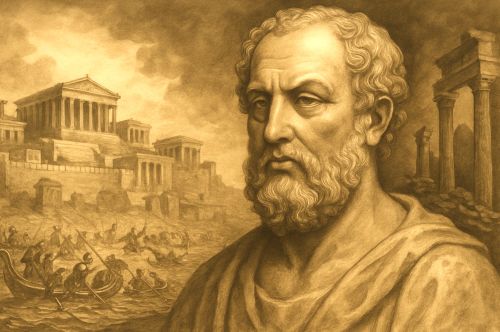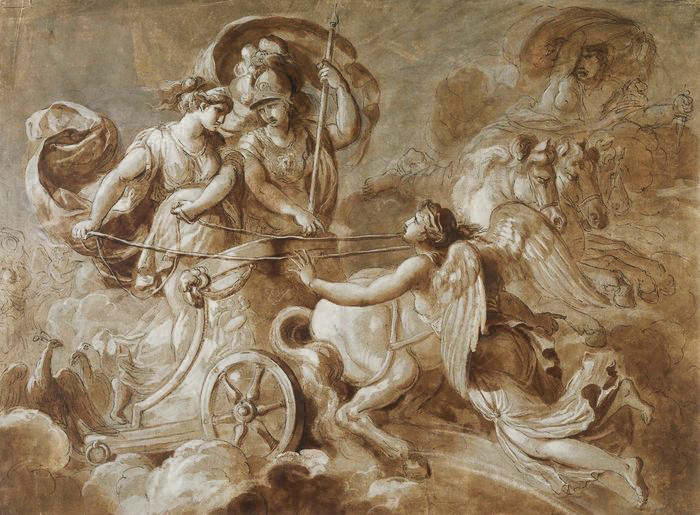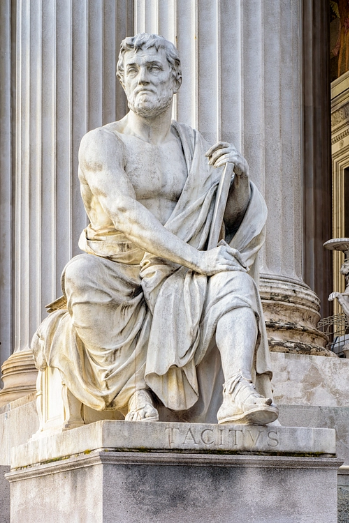

The act of rewriting history is as old as history itself. To revise is not inherently to distort; it is to engage critically with the past, to test inherited stories against evidence and reason.

By Matthew A. McIntosh
Public Historian
Brewminate
Introduction
The word revisionism has acquired an almost instinctive negativity in modern usage. In political discourse, to call a historian or public figure a “revisionist” is to accuse them of twisting the past for ideological ends, whether to deny the Holocaust, minimize the brutality of slavery, or romanticize colonial conquest.1 Such abuses of history weaponize selective memory and erasure, giving the term “historic revisionism” its pejorative cast. Yet revision is not only inevitable but necessary to the practice of historiography. New evidence, sharper methods, and critical reflection demand that history be rewritten. At its best, revisionism is the ongoing act of correcting distortions, stripping away inherited myths, and reconstructing the past on firmer ground.
Nowhere is this clearer than in the work of the Athenian historian Thucydides. Writing in the late fifth century BCE, he presented his History of the Peloponnesian War not as an epic or moral tale but as a deliberate correction of what he saw as unreliable tradition.2 Against the myth-infused poetry of Homer and the mixed narrative of Herodotus, Thucydides pursued a method grounded in eyewitness testimony, rational explanation, and political realism. He declared openly that poets embellished the past for pleasure, while earlier chroniclers lacked critical judgment, leaving the truth obscured.3 His task was not to entertain but to record events as they happened, “without exaggeration or omission,” so that the work would remain a “possession for all time” (ktema es aei).4
In this sense, Thucydides was a revisionist, but he was a revisionist in the “good” sense. He consciously stripped away supernatural causation, divine machinery, and the heroic framework of earlier narratives, focusing instead on human motives, fear, honor, and interest. In so doing, he not only revised the record of the Peloponnesian War but also redefined the very practice of history itself. This essay will examine how Thucydides’ work represents a foundational act of historical correction: a rational rewriting of inherited myth that set the standard for evidence-based historiography. By situating him within the wider problem of “revisionism,” we can better appreciate both the necessity and the dangers of rewriting history and why Thucydides remains a model for the critical historian.
The Problem of Revisionism
To call history a stable, fixed body of knowledge is itself a myth. Every generation rewrites the past, whether consciously or unconsciously, in response to new evidence, changing perspectives, or political pressures. The historian E. H. Carr famously observed that history is “a continuous process of interaction between the historian and his facts,”5 meaning that historical knowledge cannot be sealed once and for all. Yet this process of rewriting is fraught with moral and intellectual tension.
On the one hand, revisionism is often rightly condemned. The deliberate falsification or distortion of the historical record for ideological gain undermines truth itself. Holocaust denial is perhaps the most infamous example, as pseudo-historians and propagandists have attempted to erase documented atrocities through selective use of sources or outright fabrication.6 Similar patterns appear in revisionist defenses of slavery or colonialism, which seek to sanitize brutal systems of oppression by minimizing violence or exaggerating the supposed civilizing benefits of empire.7 In these cases, “revisionism” becomes synonymous with deceit, and the stakes are not merely academic but political and ethical.
On the other hand, revisionism in the sense of correction is indispensable. History is not a static archive but an evolving conversation, one in which later scholars uncover silenced voices, question inherited assumptions and apply fresh methods. The rise of feminist historiography in the twentieth century, for example, exposed the near-erasure of women’s roles from traditional narratives and insisted on their reintegration into the record.8 Postcolonial scholarship similarly revised Eurocentric accounts by incorporating indigenous perspectives and acknowledging the destructive impact of imperial rule.9 Far from falsifying history, such corrective revision restores a fuller and more accurate view of the past.
This duality is what makes the term “revisionism” so precarious. It can describe either the abuse of history for partisan ends or the necessary correction of myth and error. The difference lies not in the act of rewriting itself but in its allegiance: whether to evidence and critical method or to ideology and distortion. Seen in this light, the project of Thucydides represents one of the earliest and clearest cases of revisionism in the positive sense. By stripping away poetic embellishment and divine causation, he enacted a revision that was not only corrective but transformative, establishing new standards for what history could and should be.
Thucydides in Context

To understand the revisionary thrust of Thucydides’ work, it is essential to situate him within the intellectual climate of late fifth-century Athens. This was an era of profound cultural experimentation, when rational inquiry increasingly displaced myth as a framework for understanding the world. The Sophists, itinerant teachers and rhetoricians, encouraged critical thinking, questioning of tradition, and attention to human agency. Their emphasis on argumentation and relativism created fertile ground for more skeptical approaches to history.10
Before Thucydides, Greek historical writing was not devoid of inquiry, but it was deeply entangled with myth. Herodotus, his immediate predecessor, offered a monumental account of the Persian Wars that blended travel narrative, ethnography, and political reflection with oracles, dreams, and divine causation.11 While Herodotus pioneered the systematic collection of information (historia in its literal sense of “inquiry”), he did not entirely abandon the supernatural as an explanatory category. In his narrative, gods remained active agents shaping human destiny, and the marvels of distant lands were as central to the story as the battles themselves.12
Thucydides positioned himself self-consciously against this tradition. In the opening chapters of his History of the Peloponnesian War, he criticizes poets and early chroniclers for their lack of reliability. He charges that they embellished events for entertainment or failed to apply rigorous scrutiny to their accounts.13 His declared method involved the use of eyewitness testimony (autopsy), the critical evaluation of sources, and his own experience as a general in the war. By foregrounding accuracy and rational explanation, he signaled a sharp departure from both epic poetry and Herodotean narrative.
Just as important was the political and social context of Athens itself. The Peloponnesian War unfolded during a period of democratic innovation, imperial expansion, and ultimately, civic crisis. The intellectual currents of the city (philosophy, rhetoric, medicine, and political theory) all reflected an effort to understand human affairs without reliance on the supernatural. The Hippocratic physicians, for example, described disease in naturalistic terms, rejecting divine punishment as an explanation.14 Thucydides’ famous account of the plague at Athens resonates with this intellectual milieu, offering a clinical description that consciously avoids appeals to divine wrath.15
In this environment, Thucydides’ project of historical revision becomes more intelligible. His dismissal of myth was not merely a personal choice but part of a broader intellectual movement toward rationalization in Greek thought. Yet he carried this further than most, transforming history from a blend of entertainment and inquiry into a discipline grounded in evidence, causality, and political realism.
The “Mythological” Record Before Thucydides

To grasp the radical nature of Thucydides’ historiographical revision, one must first consider the dominant modes of representing the past in archaic and early classical Greece. Chief among these was the epic tradition, most famously embodied in the works of Homer. The Iliad and Odyssey offered a vision of warfare and heroism in which the gods intervened directly in human affairs, tipping the scales of battle, inspiring courage, or exacting vengeance.16 Though not intended as history in the modern sense, these epics profoundly shaped Greek collective memory of war and the heroic past. Generations of Greeks took their bearings from Homer’s depiction of the Trojan War, often treating it as a factual, if distant, event.17
Beyond epic, local traditions and oral histories carried mythological elements into accounts of civic origins and conflicts. Foundation stories often attributed city-building to heroes of divine parentage, while victories in war were explained as the favor of a god rather than the result of strategy or resources. Such narratives were not without their civic utility, providing shared identity and legitimacy for communities, but they offered little space for critical evaluation or causal explanation in human terms.18
Even the earliest prose chroniclers, such as Hecataeus of Miletus, struggled to disentangle history from myth. Hecataeus famously complained that the “stories of the Greeks are many and ridiculous,” yet his own Genealogies did not fully dispense with divine ancestry.19 Herodotus, though far more systematic, likewise preserved a world in which dreams, oracles, and gods explained pivotal events, from the fall of Croesus to the invasion of Xerxes.20
It was into this landscape that Thucydides introduced his revisionary method. By rejecting divine causation outright and refusing to credit poetic exaggeration, he broke decisively with the mythological framework that had long underpinned Greek historical consciousness. His narrative of the Peloponnesian War, grounded in human motives and material causes, redefined both the content and the purpose of history. Where Homer sought to immortalize heroic deeds through the medium of poetry, Thucydides sought to preserve accurate knowledge of human events through rigorous analysis.21
Thucydides as Revisionist

Thucydides did not present himself simply as a chronicler of events, but as a corrector of inherited distortions. His History of the Peloponnesian War opens with an explicit critique of previous narrators: poets, who sought to entertain, and early chroniclers, who lacked the rigor to distinguish truth from embellishment.22 He insisted that his own account would not include mythic digressions or divine causation but would instead trace the war’s origins and course through observable human actions, political decisions, and material conditions. In doing so, he positioned himself as a deliberate revisionist of the Greek tradition of storytelling.
One of the clearest instances of this rational corrective method is his account of the plague at Athens (430 BCE). Where earlier traditions would have framed such a catastrophe as divine punishment, Thucydides offers a clinical description of symptoms, possible modes of transmission, and social consequences.23 He even emphasizes his effort to record the disease so that it might be recognized if it reappeared, effectively inserting an early form of empirical epidemiology into historiography.24 By refusing to interpret the plague as the wrath of Apollo or any other god, Thucydides broke sharply with Homeric and Herodotean precedent.
His account of the Melian Dialogue is another striking example of revisionist history. In this episode, he records (or reconstructs) a negotiation between Athens and Melos in starkly realist terms: the Athenians justify conquest not by divine sanction or heroic destiny, but by an unvarnished calculus of power “the strong do what they can and the weak suffer what they must.”25 By presenting politics as a contest of interests and necessity, Thucydides rewrote the language of war away from the heroic and the mythological, grounding it instead in political realism.
Even his treatment of speeches demonstrates this revisionist impulse. Thucydides admits that he could not record words verbatim but reconstructed them to capture the essence of what was said.26 This candid admission, combined with his analytical purpose, makes clear that he viewed history not as a transcript of past utterances but as a rational reconstruction designed to reveal motives and dynamics of power. The speeches thus serve as a tool of explanation rather than a repository of poetic flourish.
By stripping away divine machinery, heroic glorification, and mythological causation, Thucydides reframed history itself. War, in his telling, was not the theater of gods and heroes but the arena of human fear, ambition, and calculation. This was revisionism in its most constructive form: not distortion but correction, not mythmaking but demythologization.
Thucydides’ Legacy: “Good” Revisionism

Thucydides’ work was not simply a singular achievement of his time; it became a model for how history could be written when stripped of myth. Later historians, both ancient and modern, recognized in him a standard of rigorous inquiry. Polybius, for instance, admired his precision and sought to emulate his commitment to causality and analysis in his own account of Rome’s rise.27 Tacitus likewise inherited Thucydides’ suspicion of rhetoric and divine explanation, presenting Roman politics as driven by human ambition, corruption, and fear rather than by fate or gods.28
In the modern era, Thucydides has often been celebrated as the “first scientific historian.”29 While this label risks anachronism, it underscores the sense that his method of rational explanation and critical evaluation marked a turning point in the discipline. Historians who labor to dismantle national myths, challenge propagandistic narratives, or bring marginalized perspectives to the forefront are, in effect, working in the Thucydidean spirit. Revisionism, when practiced as correction, is the continuation of the project he inaugurated.
This legacy, however, also highlights the double-edged nature of revisionism. The very tools that make it possible to challenge myths can also be used to create new distortions. The same skepticism that Thucydides directed against Homer can be weaponized in the hands of denialists or propagandists.30 Thus, the example of Thucydides is not only a guide but also a caution: the revisionist must remain tethered to evidence and critical method, lest correction become deception.
What makes Thucydides exemplary is precisely this allegiance. His revisionism was not in service of ideology, but of truth as he could best discern it through rational inquiry and eyewitness testimony. By insisting that history be understood as the product of human actions and decisions, he not only corrected the record of the Peloponnesian War but also set a precedent for all future attempts to write history responsibly.
Conclusion
The act of rewriting history is as old as history itself. To revise is not inherently to distort; it is to engage critically with the past, to test inherited stories against evidence and reason. The danger of “bad” revisionism lies in its allegiance to ideology over truth, weaponizing doubt to erase atrocities or legitimize oppression. But “good” revisionism, the kind embodied by Thucydides, is indispensable. Without it, history would remain shackled to myth, propaganda, and error.
Thucydides’ History of the Peloponnesian War stands as one of the earliest and clearest examples of corrective revision. In stripping away divine causation, heroic exaggeration, and mythological frameworks, he not only offered a truer account of a devastating conflict but also redefined the very nature of history. His insistence on evidence, human motives, and rational explanation created a template for what the discipline could become. Later historians from Polybius to Tacitus, and modern scholars confronting nationalist mythologies or Holocaust denial, continue to operate in the space he cleared.
The enduring relevance of Thucydides lies in his recognition that history is written by humans about humans.31 Gods, fate, and myth may shape culture, but they do not determine causality in his analysis. In a world once again awash with misinformation, distortions, and weaponized narratives, his example offers both a warning and a model: warning, in the awareness that revision can corrupt as easily as it can correct; and model, in the commitment to let evidence, reason, and human accountability guide the historian’s pen.
By consciously rewriting the past against the grain of myth, Thucydides transformed history into an act of critical correction. His ktema es aei, his “possession for all time,” is not merely the record of a single war but the enduring principle that history, when written with rigor and honesty, can be revised without being falsified.
Appendix
Footnotes
- Deborah Lipstadt, Denying the Holocaust: The Growing Assault on Truth and Memory (New York: Free Press, 1993), 15–22.
- Thucydides, History of the Peloponnesian War, trans. Rex Warner (New York: Penguin Classics, 1972), 1.1.
- Thucydides, History of the Peloponnesian War, 1.20–22.
- Ibid., 1.22.4.
- E. H. Carr, What Is History? (New York: Vintage, 1961), 24.
- Deborah Lipstadt, Denying the Holocaust: The Growing Assault on Truth and Memory (New York: Free Press, 1993), 43–51.
- James Oliver Horton and Lois E. Horton, Slavery and Public History: The Tough Stuff of American Memory (Chapel Hill: University of North Carolina Press, 2006), 12–18.
- Joan W. Scott, “Gender: A Useful Category of Historical Analysis,” The American Historical Review 91, no. 5 (1986): 1053–1075.
- Dipesh Chakrabarty, Provincializing Europe: Postcolonial Thought and Historical Difference (Princeton: Princeton University Press, 2000), 27–35.
- W. K. C. Guthrie, The Sophists (Cambridge: Cambridge University Press, 1971), 35–44.
- Herodotus, Histories, trans. Aubrey de Sélincourt, rev. John Marincola (London: Penguin Classics, 2003), 1.1–1.5.
- Rosalind Thomas, Herodotus in Context: Ethnography, Science, and the Art of Persuasion (Cambridge: Cambridge University Press, 2000), 72–85.
- Thucydides, History of the Peloponnesian War, trans. Rex Warner (New York: Penguin Classics, 1972), 1.20–22.
- Jacques Jouanna, Hippocrates, trans. M. B. DeBevoise (Baltimore: Johns Hopkins University Press, 1999), 134–145.
- Thucydides, History of the Peloponnesian War, 2.47–54.
- Homer, The Iliad, trans. Richmond Lattimore (Chicago: University of Chicago Press, 1951), 1.493–530.
- Moses I. Finley, The World of Odysseus (New York: Viking Press, 1954), 21–34.
- Robin Osborne, Greece in the Making, 1200–479 BC (London: Routledge, 1996), 97–110.
- Fragment in Jacoby, Fragmente der griechischen Historiker, FGrHist 1 F1.
- Herodotus, Histories, trans. Aubrey de Sélincourt, rev. John Marincola (London: Penguin Classics, 2003), 1.34–46.
- Simon Hornblower, Thucydides (Baltimore: Johns Hopkins University Press, 1987), 12–18.
- Thucydides, History of the Peloponnesian War, trans. Rex Warner (New York: Penguin Classics, 1972), 1.20–22.
- Thucydides, History of the Peloponnesian War, 2.47–54.
- D.L. Page, “Thucydides’ Description of the Great Plague at Athens,” Classical Quarterly 3, no. 3-4 (1953): 97-119.
- Thucydides, History of the Peloponnesian War, 5.84–116.
- Ibid., 1.22.1.
- Polybius, The Histories, trans. W. R. Paton (Cambridge, MA: Harvard University Press, 1922), 12.25g.
- Tacitus, Annals, trans. A. J. Woodman (Indianapolis: Hackett, 2004), 1.1–3.
- John Burrow, A History of Histories (New York: Knopf, 2007), 34–36.
- Richard J. Evans, Lying About Hitler: History, Holocaust, and the David Irving Trial (New York: Basic Books, 2001), 145–160.
- Arnaldo Momigliano, The Classical Foundations of Modern Historiography (Berkeley: University of California Press, 1990), 54–59.
Bibliography
- Burrow, John. A History of Histories. New York: Knopf, 2007.
- Carr, E. H. What Is History? New York: Vintage, 1961.
- Chakrabarty, Dipesh. Provincializing Europe: Postcolonial Thought and Historical Difference. Princeton: Princeton University Press, 2000.
- Evans, Richard J. Lying About Hitler: History, Holocaust, and the David Irving Trial. New York: Basic Books, 2001.
- Finley, M. I. The World of Odysseus. New York: Viking Press, 1954.
- Page, D.L. “Thucydides’ Description of the Great Plague at Athens.” Classical Quarterly 3, no. 3-4, 1953, 97-119.
- Guthrie, W. K. C. The Sophists. Cambridge: Cambridge University Press, 1971.
- Herodotus. Histories. Translated by Aubrey de Sélincourt. Revised by John Marincola. London: Penguin Classics, 2003.
- Homer. The Iliad. Translated by Richmond Lattimore. Chicago: University of Chicago Press, 1951.
- Hornblower, Simon. Thucydides. Baltimore: Johns Hopkins University Press, 1987.
- Horton, James Oliver, and Lois E. Horton. Slavery and Public History: The Tough Stuff of American Memory. Chapel Hill: University of North Carolina Press, 2006.
- Jacoby, Felix. Fragmente der griechischen Historiker (FGrHist). Berlin: Weidmann, 1923–1958.
- Jouanna, Jacques. Hippocrates. Translated by M. B. DeBevoise. Baltimore: Johns Hopkins University Press, 1999.
- Lipstadt, Deborah. Denying the Holocaust: The Growing Assault on Truth and Memory. New York: Free Press, 1993.
- Momigliano, Arnaldo. The Classical Foundations of Modern Historiography. Berkeley: University of California Press, 1990.
- Osborne, Robin. Greece in the Making, 1200–479 BC. London: Routledge, 1996.
- Polybius. The Histories. Translated by W. R. Paton. 6 vols. Cambridge, MA: Harvard University Press, 1922.
- Scott, Joan W. “Gender: A Useful Category of Historical Analysis.” The American Historical Review 91, no. 5 (1986): 1053–1075.
- Tacitus. Annals. Translated by A. J. Woodman. Indianapolis: Hackett, 2004.
- Thomas, Rosalind. Herodotus in Context: Ethnography, Science, and the Art of Persuasion. Cambridge: Cambridge University Press, 2000.
- Thucydides. History of the Peloponnesian War. Translated by Rex Warner. New York: Penguin Classics, 1972.
Originally published by Brewminate, 10.03.2025, under the terms of a Creative Commons Attribution-NonCommercial-NoDerivatives 4.0 International license.


